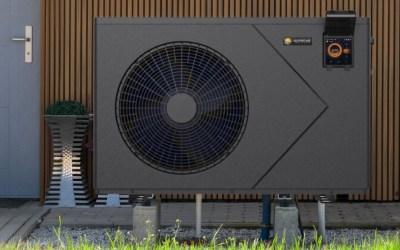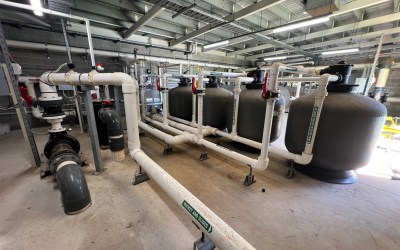How long does it take to heat a pool?
You’ve sent out invitations to a pool party, the guests start arriving, and once the general chit-chat and small talk are over, you all head out to the pool— only to realise the water is still freezing! The guests suggest waiting a while, and so you do. The hours stretch on until it’s finally time for everyone to head back home, without ever having had a dip in the pool whose waters are still freezing.
How does one avoid such a debacle as this? You took the necessary precautions after all; you invested in a pool heater!
As it turns out, something that people often tend to overlook– because they feel like the pool heater is enough insurance in and of itself–, is the time it takes for the pool heating system to heat up your swimming pool completely.
On average, this could take from 12-48 hours, but there are a series of factors that influence the time period it takes for a pool to heat up completely. This time period also differs according to the type of pool heating system you are using, with different pool heaters functioning at their best under different conditions and according to different operational mechanisms.
Generally, regardless of the type of pool heater you are using, there are three main factors that determine how much time it will take for your swimming pool to heat up completely. They are,
- The specific heat of the water
- The total mass of the water
- The amount of temperature change needed
But in order for you to get a solid idea as to how much time it will take for your swimming pool heating system to heat up your pool completely, there are a number of other variables you have to consider.
What type of Swimming Pool Heater do you use?
If you’re using a gas pool heater, it will typically take about 8-12 hours to heat up your swimming pool. Gas heaters are actually the fastest option for pool heating since they use natural gas to generate heat in cold temperatures. Gas pool heaters can heat the water of your swimming pool up to 20 degrees, which is quite a significant increase! Their principle of operation is also largely independent of the ambient temperature.
An electric heating pump, on the other hand, operates on a principle that differs from gas pool heaters. Instead of generating heat by itself, it sucks in the heat from the ambient air and transfers this heat to the water in the swimming pool. On average, an electric heat pump can take up to 12-48 hours to heat up the water in your swimming pool, up to 28 degrees. The Madimack Eco Heat Pump and the Madimack Elite V3 Heat Pump can even be set to temperatures up to 40 degrees, while the Summerwave Full Inverter Turbo Boost Heat Pump has 20% More Heat Output with the press of a button for faster heating, which is perfect for those times when you unexpectedly need a faster heat up time.
A solar pool heating system, on the other hand, is probably the slowest when it comes to heating up your swimming pool, as it can take as much as up to a few days to get your pool up to 28 degrees. However, in areas across the Gold Coast, where sunshine and warmth are found aplenty, the time it takes for your pool to heat up using a solar pool heating system can be significantly lesser than if you were based in the colder parts of the continent. In fact, the Heatseeker Suntuf Rigid Panel solar pool heating system is one of the most cost-effective and durable ways of heating your pool, turning it into a tropical oasis with large heat rises of over 10°C! The Solar Pool Heating Collectors Nanotek can also transfer the sun’s heat 30% quicker into the tubes through which the water flows, while the outer surface absorbs 20% more heat!
Local Climate
The hotter the local climate, the lesser energy the pool heating system is required to expend, in order to keep your pool warm.
In temperatures that are really cold, it often takes much longer for your swimming pool heating system to heat up the water. As those who live in the Gold Coast, we are at an advantage here: the availability of lovely unlit days year-round during the day means that our pool heating systems can do their job much faster, with a much less energy expenditure, which in turn means a much lower electricity bill if you’re using an electrical heating pump!
Pool Covers
The presence of pool covers makes a significant difference when measuring how long it takes for your swimming pool heating system to heat up your pool, completely.
During the summer days, when your pool is likely to be in use much more than during winter time, there is a lot of water that’s being displaced by all the splashing around. Additionally, water loss tends to occur during evaporation also, especially during hot summer nights. If you were to replace the water, this instantly disrupts the pool’s temperature, and since the starting temperature is a very significant determining factor in swimming pool heating time, this would mean a much longer wait while your pool water is being heated up.
Pool covers help keep the temperature of the water constant, and higher, by making sure evaporation does not take place.
To keep your swimming pool warmer for longer we highly recommend that you have a pool cover. You can choose from a range of pool covers in a variety of colours, thermal pool covers, and automatic pool covers.
Pool Size
Generally, the bigger the pool, the more water there is to heat up, which means a longer heating time.
If your pool is relatively on the small side, you can invest in a pool heating system that’s not too powerful, but if you’ve got a bigger swimming pool, it’s generally recommended that you invest in a heater that corresponds to its size. Otherwise, you might be left waiting for ages for your pool to heat up!
Other Factors
If your pool is situated in an area where there’s too little sun and too much shade, this is going to take a longer time to heat up completely, even with the aid of professionally installed pool heating systems.
This is why it’s always wise to situate your pool in an area where it receives maximum sunlight.
If your pool is an above-ground pool, it’s bound to lose more heat through its exposed walls, than if it was an in-ground pool whose walls are insulated by the earth.
The initial temperature of the water also plays a huge role in determining the amount of time it takes for the pool to heat up, completely: if the starting temperature of your swimming pool water is pretty low, it’s going to take longer for the water to heat up.
In conclusion, there are a whole bunch of factors that determine the heating time of your pool. If you’re planning on having a pool party, make sure you consider all these factors and that you have a pretty good approximation of how much time your swimming pool will take to be heated up completely, so you’ll never again have to keep your guests waiting!
Happy Pool Heating…on time!










